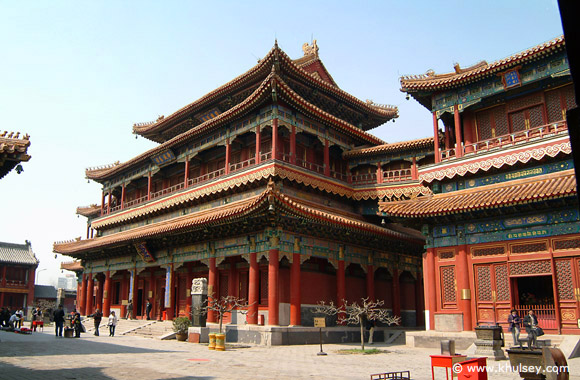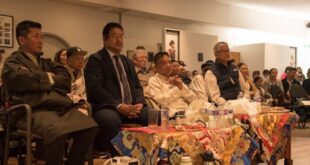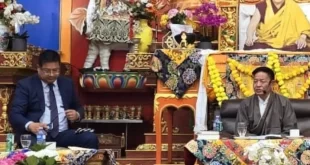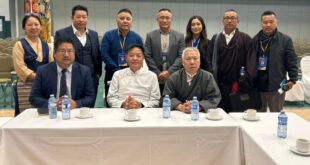ANANTH KRISHNAN
The Hindu (an Indian national daily)
BEIJING, December 25, 2011—On Christmas Eve, some of Beijing’s wealthiest and most well-connected residents headed to a sprawling villa on the city’s outskirts.
A faux European-style mansion, which sits on an expansive property hidden from public view by high walls and tight security, on Saturday evening played host to a gathering of Communist Party officials and businessmen.
Social networking, rather than the festive spirit, may have been the real purpose of the grand Christmas celebration; it was, however, precisely the kind of event that a senior Communist Party official hit out at this week in an unusual article that chastised his colleagues for taking part in any activities with “religious” hues.
Chinese government officials gathering to celebrate Christmas in such lavish style would have been unheard of in Mao’s China.
But as the Communist Party of China (CPC) has loosened its attitude towards religion, allowing the setting up of State-sanctioned churches and Buddhist temples in the three decades since Deng Xiaoping’s reforms, some of its more than 80 million members have also followed suit.
One prominent Buddhist temple in Beijing even counts among its biggest donors CPC officials, who make secretive evening prayer visits at the end of a day’s work, one monk told The Hindu.
This week, a top CPC official took aim at this trend, slamming the “growing occurrences of CPC members participating in religious activities”.
Some of them, he complained, went as far as “establishing close contacts with religious figures and some members becoming de facto religious believers”.
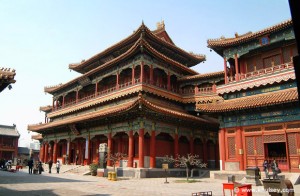
The official was Zhu Weiqun, who is an executive vice minister of CPC Central Committee’s United Front Work Department, the highest party body responsible for religious affairs. Mr. Zhu is also the official tasked with supervising religious issues in Tibet, and he represents the CPC in its on-going talks with the Dalai Lama.
In an unusually candid article in this month’s issue of Qiushi (Seeking Truth), the CPC Central Committee’s official journal circulated among party members, Mr. Zhu warned that the party would suffer “pernicious” consequences if members were allowed to believe in religion.
“Party organisations will be greatly weakened in the fight against separatism, as hostile forces home and abroad are doing what they can to use religion for their separatist activities,” he wrote.
He revealed some CPC members had even called for the official ban on cadres believing in religion to be lifted.
“If the Party lifts the ban as some people suggest,” he warned, “it can hardly see the promised benefits and will instead suffer obvious pernicious consequences.”
IDEOLOGICAL MOORINGS
Mr. Zhu’s message has sparked debate among the CPC’s members, and come in for criticism particularly among younger and more liberal cadres who say the party has, in any case, shed much of its older ideological moorings as it has evolved. This week, a group of younger cadres debated Mr. Zhu’s article at a gathering in a university in north-western Beijing.
One CPC youth member said the party “should not interfere with members’ beliefs.” “Beliefs are a spiritual support to the people,” he said. Others disagreed. “If every member has his own belief,” warned one, “then there will be chaos within the party. In order to maintain stability, we cannot have religious beliefs.”
Since the Chinese Constitution allows for freedom of religious belief, some CPC members have said the party’s ban on religion is unconstitutional. The measures are particularly unpopular in ethnic minority areas such as Tibet and Muslim-majority Xinjiang, where officials are explicitly warned that they will lose their jobs if they hold religious beliefs. In Xinjiang, Uighur Muslim government officials are neither allowed to pray in mosques nor undertake fasts during the holy month of Ramadan.
Mr. Zhu, in the article, said freedoms for citizens need not apply for CPC members. “When a citizen voluntarily joins in the CPC,” he said, “he or she accepts the Marxist dialectical materialism view of the world and has the right to believe in no religion. It has to be clear-cut that people who are not CPC members have freedom of religious belief, and CPC members shall not believe in religion.”
The CPC would be divided “ideologically and theoretically” if members were allowed to believe in religion, he cautioned. It was “not accidental”, he added, that Party committees in Tibet and Muslim-majority Xinjiang where “anti-secession struggles were most acute” had taken “a clear-cut stand that Party members shall not believe in religion.”
